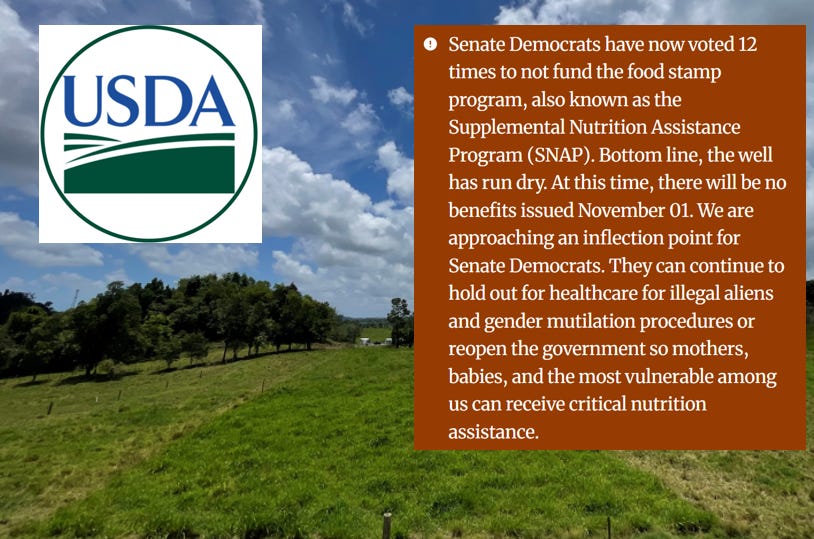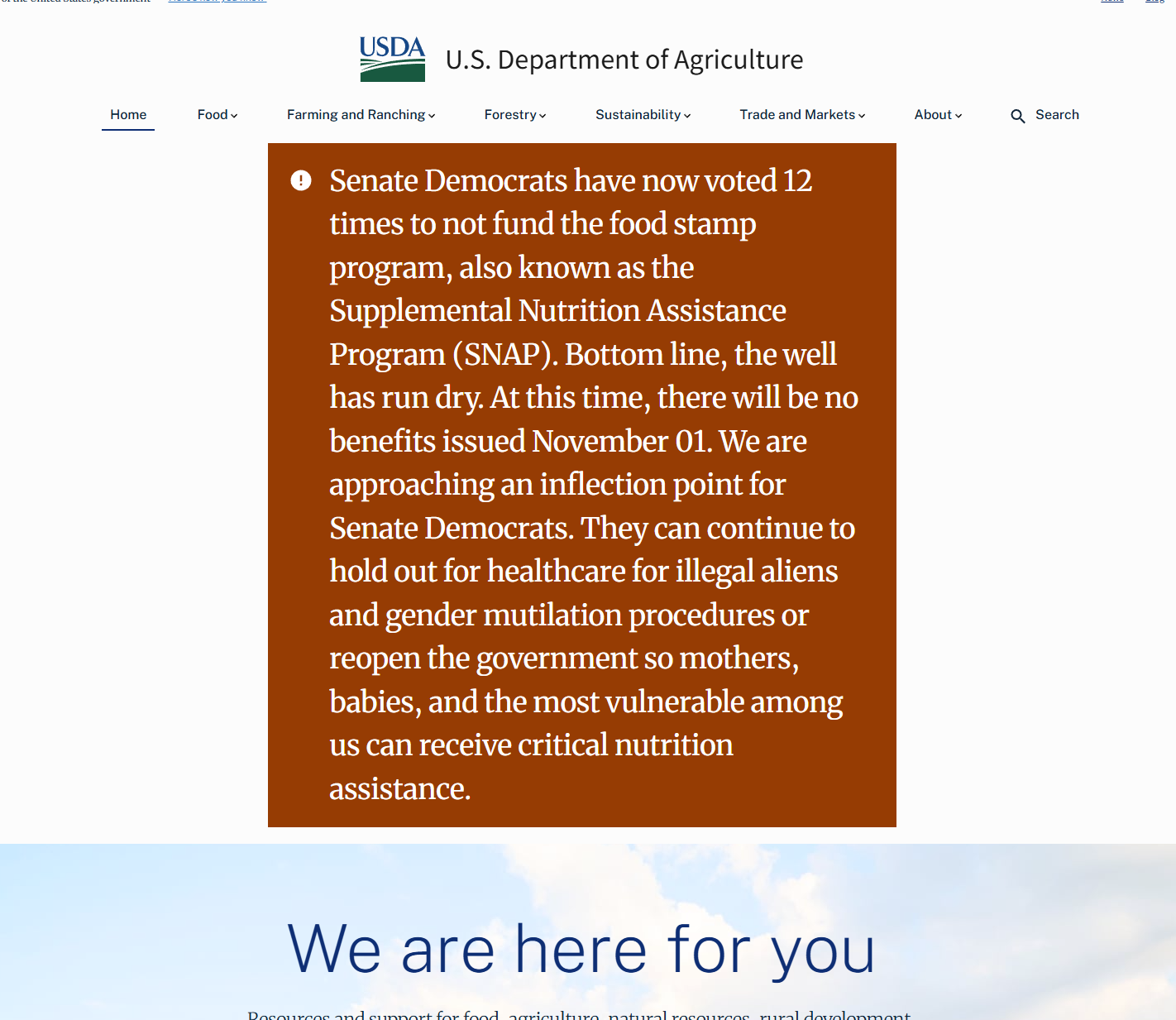USDA Website Blames SNAP Benefits Expiring On Trans People And Immigrants During Shutdown
The benefits, which are set to expire on November 1st due to the government shutdown, will lead to millions of people struggling to secure access to food.
This morning, news broke that the Trump administration will not use emergency funds to pay out SNAP benefits to the millions of Americans who rely on them starting November 1. The benefits are set to expire as the government shutdown drags on, with Democrats and Republicans at an impasse over a series of funding bills for FY 2026 loaded with conservative policy riders. The main sticking point centers on whether to extend Obamacare subsidies—without which millions could see their health insurance costs skyrocket. In an official notice posted to the USDA website, the administration blamed Democrats for the lapse, accusing them of holding out for “healthcare for illegal aliens and gender mutilation procedures”—a message that scapegoats marginalized groups and, experts warn, may itself violate federal law.
“Senate Democrats have now voted 12 times to not fund the food stamp program, also known as the Supplemental Nutrition Assistance Program (SNAP). Bottom line, the well has run dry. At this time, there will be no benefits issued November 01. We are approaching an inflection point for Senate Democrats. They can continue to hold out for healthcare for illegal aliens and gender mutilation procedures or reopen the government so mothers, babies, and the most vulnerable among us can receive critical nutrition assistance,” reads the memo posted on top of the USDA website as of Monday morning.
The message accuses Democrats of shutting down the government to protect transgender people and undocumented immigrants. The shutdown followed the Senate’s failure to pass compromise legislation on a series of funding packages for fiscal year 2026. When those measures collapsed, focus shifted to a “continuing resolution” that would have temporarily kept the government open without the controversial policy riders—buying time for further negotiation. But that, too, fell apart when Democrats insisted on preserving Obamacare subsidies to prevent millions of families from facing soaring insurance premiums. With neither a full-year funding bill nor a stopgap resolution in place, the government shut down, leaving federal agencies unfunded and millions at risk.
Trump turning his focus on transgender people raises the temperature that when an eventual deal is brokered, Americans could see the inclusion of some of those anti-trans riders as a major policy priority of the President for compromise legislation. Among the policies that have been suggested: The House appropriations bills for Labor, Health and Human Services, and Education includes a sweeping ban on “any federal funds” supporting gender-affirming care and attacks on health insurance coverage for transgender people. Interpreted broadly, that language could dismantle programs at hospitals nationwide for all transgender people and block Medicare and Medicaid from covering transgender healthcare altogether. The Commerce, Justice, and Science bill, the Financial Services and General Government bill, and even the National Defense Authorization Act on the house side carry provisions ranging from Pride flag bans to bathroom bans on military bases to rules forcing transgender people into prisons aligned with their sex assigned at birth. Taken together, these bills amount to a wholesale rewrite of federal policy on LGBTQ+ rights—one that would instantly transform the legal and medical landscape for transgender people.
The USDA post is part of a broader pattern: a wave of overtly partisan messages that the Trump administration has published across federal websites in recent weeks. Legal experts warn that such posts may violate multiple federal laws prohibiting the use of taxpayer funds for political purposes, including the Anti-Lobbying Act and the Hatch Act. Politico reports that several Hatch Act complaints have already been filed against the administration. Yet few expect meaningful consequences—Trump’s team has repeatedly brushed off legal constraints, asserting near-limitless executive authority to use the machinery of government for partisan ends.
The message comes as experts warn that more than 42 million Americans could lose access to food assistance, with SNAP benefits set to expire as the shutdown drags into November. For many families, opening the USDA website to check on SNAP status now means being met with a partisan message blaming Democrats, immigrants, and transgender people for their hunger. It’s a cynical weaponization of federal platforms—turning what should be a lifeline into propaganda aimed at stoking resentment against marginalized groups. Whether that tactic holds political power remains to be seen. It’s one thing to scapegoat transgender people while out of power; it’s another to keep doing so when your party controls every branch of government, and voters are watching their groceries—and their patience—run out.
This is a lesson some Republicans are already learning in Virginia, where GOP candidate Winsome Earle-Sears has poured millions into anti-transgender ads attacking her opponent, Abigail Spanberger. But this time, the old playbook isn’t landing. Polling shows that the number of voters who list transgender issues as a top concern has actually fallen since the ad blitz began—and Spanberger continues to hold a double-digit lead. The attacks seem increasingly out of touch in a political moment when transgender people, far from being the source of the nation’s problems, have been systematically stripped of power and protections under the Trump administration. Blaming this marginalized group for America’s ills may once have been a reliable wedge—but voters appear to be moving on.
Regardless of where voters stand, many Republicans in power continue to lean hard into anti-transgender politics—and the ongoing negotiations to reopen the federal government will almost certainly make trans people a bargaining chip again. When Congress debates the full fiscal year 2026 funding bills, dozens of anti-trans provisions are expected to resurface. Democrats, for their part, have shown flashes of resistance but also moments of retreat—most notably when they voted for a Senate version of the National Defense Authorization Act that included anti-trans measures. For advocates, the message is clear: don’t wait for politicians to do the right thing, call your elected officials and let them know your stance on federal budget negotiations and transgender rights.




if only there were consequences for breaking laws
Wow, these people know absolutely NO SHAME at all